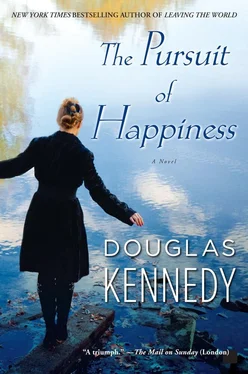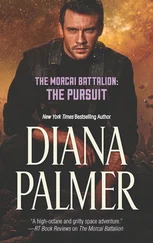'I think they'll wait for us', Joel Eberts said, and I found myself giggling for the first time in days.
'Eric would have loved this', I said over the din of car horns. 'The perfect New York send-off. Even though he never really liked Queens'.
'No one from Manhattan likes Queens, the Bronx or Brooklyn', Joel Eberts said. 'The problem is, when you're dead - Manhattan doesn't want you anymore. So you inevitably end up being shipped to Queens, the Bronx or Brooklyn. I think that's called "irony"'.
'Did your brother specify cremation in his will?' Roger Webb asked.
'There was no will', Joel Eberts said.
'Predictably', I said. 'Eric was anti-efficient. Not that there was any estate to speak of. Even if there was, those bastards in the IRS would swallow it whole. No doubt, they'll now try to put some sort of lien on the few odds-and-ends he left behind'.
'That's another day's work, Sara', Joel Eberts said.
'Yeah, I guess it is', I said wearily.
'Joel's right', Jack said, squeezing my hand. 'One thing at a time. You've been through enough'.
'And it's not over yet', I said bleakly.
'That was a hell of a good sermon, Reverend', Joel Eberts said. 'But I've got to tell you something - though I think turning the other cheek is a noble, high-minded idea, putting it into practice is goddamn impossible... 'scuse my French'.
'I'm a Unitarian - so you can use "goddamn" all you like', Roger Webb said with a smile. 'But you're right. "Turning the other cheek" is a Christian idea. And like most ideals - especially Christian ones - it's exceptionally difficult to live up to. But we must try'.
'Even in the face of out-and-out betrayal?' Joel Eberts asked. 'Sorry - but I believe there's a cause-and-effect to our actions. If you risk doing a, then b will inevitably happen. The problem is - most people think that they can dodge the consequences of b. They can't. Things always catch up with you'.
'Isn't that a rather Old Testament view of morality?' Roger Webb asked.
'Hey - I'm Jewish', Joel Eberts said. 'Of course I take an Old Testament line on such things. You make a choice, you make a decision. You live with the ramifications'.
'So, in your book, there's no such thing as absolution?' Jack asked.
'Spoken like a good Catholic', Joel Eberts said. 'That's the big difference between the Irish and the Jews. Though we both wallow in guilt, you guys are always chasing absolution. You're always working the forgiveness angle. Whereas we Jews go to our graves blaming ourselves for everything'.
The traffic eventually started moving. Within ten minutes, we were at the gates of the cemetery. We all fell silent again. We followed the paved road, past row after row of graves. Finally, after acres of headstones, we reached a squat stone building, topped by a long narrow chimney. The hearse bypassed the front entrance, and headed toward the rear of the crematorium. We stopped by the entrance. The limousine driver turned back to us and said, 'We'll wait here until somebody comes out and tells us they're ready'.
Ten minutes later, a greying gentleman in a dark suit emerged from the doors of the crematorium and nodded towards us. We went inside. The chapel was a small, simple room - with five rows of pews. Eric's coffin was on a bier, to the right of the altar. We filed down to the front row. As previously agreed between us, Roger Webb did not offer a final prayer. Or a final benediction. He simply read a single passage from the Book of Revelations:
And God shall wipe away all tears from their eyes; and there shall be no more death, neither sorrow, nor crying, neither shall there be any more pain: for the former things are passed away.
I didn't believe a word of that Biblical passage. Nor did my late brother. Nor, I sensed, did Roger Webb. But I'd always loved the sentiment behind those lines: the idea of an eternity without anguish or adversity; a celestial pay-off for the vicissitudes of life. Roger Webb spoke the lines beautifully. So beautifully that I felt a small sob catch in my throat. A moment later, I heard the clank of machinery. A curtain behind the bier opened, and a belt beneath the coffin rolled it towards the furnace. Immediately, I stiffened. Immediately, Jack took my hand. And held it tightly.
The curtains closed. The funeral director opened the chapel doors. We left - and rode back to the city in silence.
When we reached my apartment, Jack offered to stay with me for another night. But that would have made five nights in a row - and though he didn't say anything, I was certain that Dorothy was getting rather anxious about his extended absence from home. I didn't want to do anything that upset the equilibrium which had been established between his two households, so I insisted he return to his family.
'I'll tell you what', he said. 'I'll take the rest of the week off work, and be with you all day tomorrow'.
'You can't do that', I said. 'And you know it. You've already taken half of last week off'.
'You are more important'.
'No', I said, taking him in my arms. 'I'm not. You've got a job to be getting on with. Don't risk it for me. I'll be all right'.
He promised to call me twice a day, every day. The first call of the next morning, however, came from the Riverside Funeral Home. Eric's ashes had arrived back from the crematorium. Would I be home this morning to receive them?
An hour later, the doorbell rang. It was a gentleman in a dark suit and a Homburg. With a slight bow, he asked me my name, then handed me a small box, wrapped in brown paper. I brought it inside, placed it on my kitchen table, and stared at it for a very long time, not wanting to open it. Eventually, I got up enough nerve to tear off the paper. I hadn't requested an urn - so the remains of my brother were returned to me in a square cardboard box. The box was painted grey, with a marbleized finish. A simple white card adorned its cover. On it was written: Eric Smythe. I admired the calligraphy. It was most impressive.
I stopped myself from raising the cover and peeking inside. Instead, I stood up, grabbed my raincoat, and placed the box in one of its pockets. Then I left my apartment and walked down Broadway to the 72nd Street subway station.
I knew where I was going. I had chosen the venue days earlier - when pondering (in the few lucid moments I'd had since Eric's death) where he might like his ashes sprinkled. Though the Hudson River was convenient to us, I knew he'd object to the idea of ending up anywhere in the vicinity of New Jersey - as he made ceaseless jokes about the Garden State (once when I suggested an outing to Princeton and environs, he tartly said, 'Sorry - I don't do Jersey').
The East River was also struck off my list of possibilities - as it had no associations for him whatsoever. Nor did Central Park - because, at heart, my ultra-urban and urbane brother didn't really think much of greenery or wide open spaces. He loved the jangled chaos of city streets, the snarled traffic, the edgy ambulation of crowds, the sheer manic brio of Manhattan. Part of me wanted to scatter him on 42nd Street - but that seemed just a little too bleak. Then the idea hit me. Though Eric had no affinity with verdancy or lush terrain, he did spend a considerable amount of time in that most citified and gritty of public spaces: Washington Square Park. During all those years he lived in the Village, it was his outer office: a place in which he'd loiter for hours on a park bench with a novel, or take on the chess hustlers who occupied the northeastern corner of the park. He often spoke about how much he loved the park's egalitarian rough-and-tumble, not to mention the ragtag collection of New York characters who gathered within its confines every day.
'I sit in this park', he once told me, 'and I know why the hell I walked out of Hartford and never looked back'.
Читать дальше












